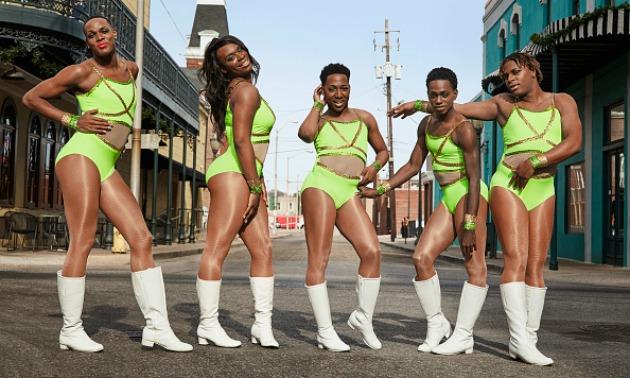
Source: Oxygen Media/ NBCUniversal / Getty
On the series premiere of Oxygen’s The Prancing Elites Project, a woman posed a well-meaning but otherwise stupid question to Adrian Clemons, Kentrell Collins, Kareem Davis, Jerel Maddox and Tim Smith, who make up the dance team known as The Prancing Elites. The woman, spotting the group standing as attendants rather than performers, wondered, “Why aren’t y’all out there?” Kentrell, the stern, no nonsense captain of the dance squad, was blunt: “GIRL, YOU KNOW WHY!”
She sure did, only sometimes people want to assume the best even when their worst fears are right in front of them. The new series chronicles the gender-bending group’s attempts to simply do what they love without ridicule from residents of their native Mobile, Ala. For anyone who’s frequented a gay club in the south primarily attended by other Black people, you are familiar with the sight of a group congregating at some point to J-Set. J-Setting, is a style of dance popularized by the Jackson State University marching band dance team, the Prancing J-Settes.
I’ve seen plenty of men do the moves of majorettes inside of gay clubs. I know for a fact that on many a Friday or Saturday night at a gay club, this is their chance to do what makes them happiest in peace. Many of them practice for it during the week to make sure the moment counts. No matter if they’re wearing sequins, dancing in a way that reads as “feminine,” and bearing faces that are “painted for the gawds,” be clear that it takes a lot of balls to step out of your comfort zone to do something you know will tick other people off.
And if we’re being completely honest, I, too, used to be obsessed with the way majorettes in marching bands danced. I have copied those moves before, only in the secrecy of my own room. Even if I’ve come to accept my homosexuality, I’ve had struggles with reconciling sexual preference with my sense of masculinity. These five individuals are far more secure than many of their critics and supporters.
Yes, they’ve netted some notoriety by way of a retweet from Shaquille O’Neal, numerous national television appearances, and on the premiere, an on-air fan out starring NeNe Leakes. Even so, when it comes to those within their community, their remains much resentment— which curbs them from performing at local parades. They’re open to opportunities outside of that, but they’ve modeled themselves after marching band dancers. Clearly, they want to be able to dance and march in parades.
Despite being met with rejection, we see Kentrell convince them to put on their uniforms and perform albeit on the sidelines. In response, they’re greeted with boos and hisses from parade goers. As their agent explains to them, they are rejected primarily under the pretense that they are not “family friendly.”
Because many idiots continue to conflate sexual orientation immediately with sex. Because men and women who do not behave as they are socialized to are perceived as seedy. At one point, Adrian cries, explaining, “I just feel like I have this disease that no one wants to be around.” Fortunately, some of the people cry with them, pushing them to keep going. This includes a mom, a very young girl, and a dad who reminds me of the Brawny man.
Already, I’ve heard and seen other gay Black men complain about this show. Yes, TV is more inclined to show an effeminate Black gay man than someone who comes across as more in line with heteronormativity. Okay, reality TV execs sure do love to feature country Black folk on. As I always say, though, everyone has a right to tell their story and much of the finger pointing in situations like these are aimed at the wrong targets.
The show may be about people just wanting to dance, but it’s also an exploration into gender, class, race, and homophobia. In one group there’s someone who is trans, athletic, effeminate, and so on. They are different, and yet, not. Such is the point.
Not to mention, more often than not, when you see an effeminate gay man on TV, you see them as an accessory and/or comic relief. This show, like Fuse’s Big Freedia, allows you to truly see them whole.
After the group finishes dancing on the sidelines at one parade, Kentrell tells his fellow dancers, “We made our point. Let’s just go.” They may have made their point that day, but until the majority of people don’t see the problem with this group wanting to dance, their show must go on.
Michael Arceneaux hails from Houston, lives in Harlem, and praises Beyoncé’s name wherever he goes. Follow him @youngsinick.
<p>Facebook Live Is Loading....</p>




